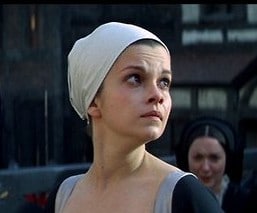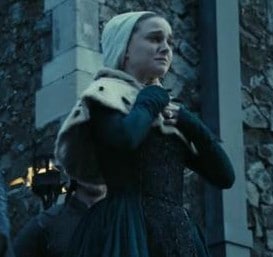 Here at The Anne Boleyn, I’m always happy to publish guest articles by historians and quality articles from Tudor history fans, so I’m delighted to share this piece of creative writing from Anne Boleyn Files visitor, Carolyn M. Lucas. Carolyn’s retelling of Anne Boleyn’s execution is based on a very vivid dream she had recently and is a very moving account. I hope you enjoy it as much I did.
Here at The Anne Boleyn, I’m always happy to publish guest articles by historians and quality articles from Tudor history fans, so I’m delighted to share this piece of creative writing from Anne Boleyn Files visitor, Carolyn M. Lucas. Carolyn’s retelling of Anne Boleyn’s execution is based on a very vivid dream she had recently and is a very moving account. I hope you enjoy it as much I did.
My End Is My Beginning
Carolyn M. Lucas
“Madame, it is time.”
Anne faced the doorway with a composure she didn’t feel, and replied, “I am ready, Master Kingston.” He nodded gravely, bowed his head to her briefly, then turned to lead the way out of her rooms.
“Free!”, she thought giddily as she stepped across the threshold. Finally, she would be able to leave these rooms! Then she sobered abruptly, remembering what lay at the end of this brief freedom. She squared her shoulders and held her head up. She would die as the queen she was, she thought fiercely. She had spent the night in prayer and in reminiscences with her ladies, and had come to a sort of peace and composure. She had reminded herself that she wasn’t the first person to die unjustly, nor would she be the last. She had felt a pang at that, remembering her brother and the others who had died with him. Because of her. Because George was her brother, and the others, her friends and allies. Because her husband meant to be rid of them all.
She had watched, weeping, from the tower window. She had been too far away to hear them, but Master Kingston had sent one of his men to her later, as she lay sobbing, to tell her their last words. She had been so proud of George, at his composure and dignity, and hoped to die as bravely herself. And Henry Norris, there only because he had been the one present when her jangling nerves and sense of impending doom had caused her to lash out at him verbally. There had been witnesses to her loose tongue, and now he was dead, too. She had been grateful and humbled that he had gone to his death proclaiming her innocence.
And Mark Smeaton- she had been indignant when she had heard he confessed to what had never been. How could he? But then she realized- of course, he had been tortured. He hadn’t the rank to prevent it. And they had hurt him until he said whatever they wanted him to say, just to make the pain stop or maybe, to be granted a more merciful death. She had prayed for them all, of course. But she had sent up an extra plea for Mark, that God would be merciful. Certainly, He would know what they had done to him, how afraid and in pain he had been. She had prayed that God would hold him blameless for this, that the blame rightfully should be placed at the feet of the men who had done this- then had stopped herself. She should forgive, she had told herself. They were just following orders that came from- she stopped herself again. She must forgive or she would never find the peace she so desperately needed to face her own ordeal.
They had sent Archbishop Thomas Cranmer to her yesterday morning to hear her confession. She had asked Master Kingston, the Constable at the Tower, to stay so he could hear what she said. She gave him permission; nay, commanded him to tell others openly what he had heard. She had then proclaimed her innocence before God, swearing on the eternal damnation of her soul that she had never been unfaithful to her Lord and husband. Her king. After the Constable had left, Cranmer told her quietly that her marriage to Henry had been annulled on the grounds that her sister, Mary, had been his mistress before she and Henry had fallen in love. Yes, yes, she knew this already; Henry had sought a dispensation for that before they had ever married. She felt a hysterical giggle bubble up inside her. How could she possibly be guilty of adultery, then, if she had never truly been his wife? She knew, though, that it didn’t matter to Henry. He wanted her gone and his word was law.
She had asked the archbishop to look after her daughter, Elizabeth, who was now declared a bastard. Not even three years old- she couldn’t possibly understand what was happening. I don’t understand it, Anne admitted to herself. Thomas had looked at her with eyes shining with tears and had sworn to her he would do everything in his power to help Elizabeth and to oversee her religious upbringing. That he would tell her, when she was older, what her mother had been like, what had happened, and how much Anne had loved her. Anne had already asked her chaplain, Matthew Parker, to take care of Elizabeth if anything should happen to her. Between the two men, Anne felt at peace that Elizabeth was in the best possible hands. She had also asked the constable’s wife, Lady Kingston, to go to the Lady Mary and ask her in Anne’s name to forgive her for the wrongs she had done to her. It was all she could do now; it would have to be enough.
Anne’s musings stopped as she realized her feet had carried her to the Coldharbour Gate and the crowd that lay beyond. She forced herself to show no fear, smiling pleasantly as though she were processing to the chapel or to a feast. The crowd was subdued. Some crossed themselves as she passed them, and others reached out to touch her cloak. Some faces were hostile, while others wept and bobbed their heads as she went past. She could hear the faint clinking of the coins behind her that her ladies passed out as alms along the way.
 Ahead lay the scaffold. She quailed inwardly as she saw it for the first time. There was another knot of people gathered here, too. They simply stood silently and watched her approach. These were the Lords and gentlemen whose rank or position entitled them to witness her death, and few of them were sympathetic to her, she knew. She saw the Duke of Suffolk, Charles Brandon. He had once been an ally of hers, but he was the King’s brother-in-law and Henry’s man to the last. She saw the headsman standing silently on the scaffold. He had been hired from Calais at great expense to dispatch her. He was an expert in the French manner of beheading- the victim knelt upright and was beheaded by sword. He was very skilled and the sword much sharper than an axe. It was much better than kneeling and putting one’s neck on the block, hoping the axeman didn’t botch it. Better, too, than being burned alive. She had originally faced that as a possible means of execution, as that was what the law decreed for a queen who committed adultery. It was also the penalty for witchcraft, and although she hadn’t been charged with that as well, she knew the murmurings put about by the King and his men, that she had used sorcery to seduce him into marriage. Her lips twisted wryly. How like Henry to blame others for his own actions, and by claiming such, he could also neatly avoid any blame for ending his first marriage. It was all Anne’s fault. He had even proclaimed that he would undo the divorce and go back to Katharine, if only he could. Conveniently, he hadn’t said that until after Katharine was dead. And now Anne would die, too, and Henry would be free to marry again. She forced her thoughts away from that subject.
Ahead lay the scaffold. She quailed inwardly as she saw it for the first time. There was another knot of people gathered here, too. They simply stood silently and watched her approach. These were the Lords and gentlemen whose rank or position entitled them to witness her death, and few of them were sympathetic to her, she knew. She saw the Duke of Suffolk, Charles Brandon. He had once been an ally of hers, but he was the King’s brother-in-law and Henry’s man to the last. She saw the headsman standing silently on the scaffold. He had been hired from Calais at great expense to dispatch her. He was an expert in the French manner of beheading- the victim knelt upright and was beheaded by sword. He was very skilled and the sword much sharper than an axe. It was much better than kneeling and putting one’s neck on the block, hoping the axeman didn’t botch it. Better, too, than being burned alive. She had originally faced that as a possible means of execution, as that was what the law decreed for a queen who committed adultery. It was also the penalty for witchcraft, and although she hadn’t been charged with that as well, she knew the murmurings put about by the King and his men, that she had used sorcery to seduce him into marriage. Her lips twisted wryly. How like Henry to blame others for his own actions, and by claiming such, he could also neatly avoid any blame for ending his first marriage. It was all Anne’s fault. He had even proclaimed that he would undo the divorce and go back to Katharine, if only he could. Conveniently, he hadn’t said that until after Katharine was dead. And now Anne would die, too, and Henry would be free to marry again. She forced her thoughts away from that subject.
She gathered her skirts and ascended the scaffold. Not too fast, she told herself. Not slowly, either, so that no one could claim she had shrank back in fear. Deliberately, with dignity, she climbed the few short steps and looked out across the crowd, hearing the others coming up behind her. She searched the faces, locking eyes with Thomas Cromwell with a flare of anger. The architect of her destruction. She was gratified to see his eyes drop from hers. That small victory steeled her nerves for what was next. She realized that she had been silent too long, and panicked for a second, fearing the executioner would proceed. She stepped closer to the Constable and quietly asked him, “I pray you, Master Kingston, not to give the order for my death until I have said what I have a mind to say. I promise I will only say what is good.” He nodded somberly, and she approached the edge of the scaffold to address the crowd.
She had practiced this speech for hours to get it right, so that she wouldn’t forget anything. All she had to do was say the first few words, and the rest would follow. Raising her voice to be heard by the crowd, she began: “Good Christian people…” It had been important to her to make it clear that she was submitting to her fate without confessing to any crimes. She hadn’t committed any. Except perhaps, of failing to give Henry the son she had so rashly promised him. She had certainly tried. During her scant three and a half years of marriage, she had been endlessly pregnant or recovering from childbirth. Or miscarriage. Too many of those, and only a daughter to show for all the years that she had loved Henry, had longed to be his wife, and finally was. And now it was over. She still felt stunned by how quickly he had turned against her. Certainly, they had argued over the years- they were a passionate couple and had made up as fiercely as they had argued. But still, he had turned Christendom upside down for her, had waited years to make her his. How could that change so quickly?
 Finishing her speech, she knelt to pray. Standing again, it was the executioner’s turn to kneel and ask her forgiveness. This was part of the ritual; it was known and expected. She murmured her forgiveness to him in French, pleased that a small smile quirked up at the corner of his mouth at the gesture. She then repeated it louder, in English, for the crowd to hear, and as he stood, she gave him the pouch of money Master Kingston had given her to pay him. This was also part of the ritual. And now on with the rest. Her ladies helped her to remove her cloak and jewelry, then she removed her hood, leaving her hair beneath covered with a simple white coif. She bade her ladies goodbye, and handed the small prayer book she carried to the Constable, asking him to deliver it to her good friend, Margaret Wyatt, Lady Lee. Then she asked the crowd to pray for her, and knelt for the last time, tucking her gown modestly around her feet. As one of her ladies began to tie the blindfold for her, she was comforted to see the crowd kneeling down in prayer for her, before she saw nothing at all.
Finishing her speech, she knelt to pray. Standing again, it was the executioner’s turn to kneel and ask her forgiveness. This was part of the ritual; it was known and expected. She murmured her forgiveness to him in French, pleased that a small smile quirked up at the corner of his mouth at the gesture. She then repeated it louder, in English, for the crowd to hear, and as he stood, she gave him the pouch of money Master Kingston had given her to pay him. This was also part of the ritual. And now on with the rest. Her ladies helped her to remove her cloak and jewelry, then she removed her hood, leaving her hair beneath covered with a simple white coif. She bade her ladies goodbye, and handed the small prayer book she carried to the Constable, asking him to deliver it to her good friend, Margaret Wyatt, Lady Lee. Then she asked the crowd to pray for her, and knelt for the last time, tucking her gown modestly around her feet. As one of her ladies began to tie the blindfold for her, she was comforted to see the crowd kneeling down in prayer for her, before she saw nothing at all.
Nervous again, she began to pray, but was distracted by a sound behind her. Involuntarily, her head turned that direction, then she caught herself and turned her head forward again. It was important to hold one’s head still so that the executioner could make a clean cut, but she also knew the blow could come at any moment now. Master Kingston had assured her it wouldn’t hurt, but how could he know, truly? How could anyone know for sure? Another sound, and as she started to turn her head again, she heard the executioner call out, “Boy! Bring me my sword!” and she heard the lad in the direction of the steps answer. So. She had a few more seconds left, then.
Suddenly, she felt a blow and felt herself falling forward. No! She must get up. She must not do anything to take away from this last image of her dignity. But she couldn’t seem to move, her vision was darkening, and it was becoming very difficult to think. She had to do something. What was it? She couldn’t remem-
And then she was opening her eyes and raising up, and to her consternation, continued to rise until she was hovering above the scaffold. Oh Lord, they’ll really believe I’m a witch now, she thought frantically, stifling the urge to giggle. And realized she was looking down as a body was being covered on the scaffold. No one was looking at her. Her ladies were sobbing and the crowd was beginning to disperse. The truth dawned on her.
“I’m free!” she exulted, feeling a pull to climb higher. All of the fear, pain and regrets flowed away. She surged upward, joyously.